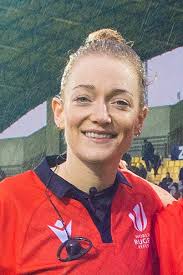Hollie Davidson: Breaking Barriers in Rugby Refereeing

Introduction
Hollie Davidson has emerged as a prominent figure in the world of rugby officiating, marking her place in sports history as the first female referee to officiate a men’s professional rugby match in the United Kingdom. This groundbreaking achievement not only signifies a shift in the traditional roles within the sport but also inspires a new generation of female officials.
Her Journey into Rugby Officiating
Born in Aberdeen, Scotland, Davidson grew up surrounded by rugby. However, it wasn’t until she attended Edinburgh University that she discovered her passion for officiating. After initially playing the sport, she shifted her focus to refereeing, where she quickly began to make a name for herself. Davidson officiated her first match in 2013 and has since climbed the ranks, receiving her World Rugby referee status in 2019.
Historic Matches and Recognition
In September 2021, Davidson officiated her first men’s professional match during the Scottish Cup, making headlines not only for her performance but also for being a trailblazer for women in rugby. Her work on the field has been praised for its professionalism and fairness, where she commands respect from players and coaches alike. Davidson’s contribution to the sport has garnered significant media attention, leading to greater visibility for female referees and challenging the status quo in a traditionally male-dominated field.
Expanding Opportunities for Women
Davidson’s rise is indicative of a larger movement to expand opportunities for women in rugby and sports officiating. With initiatives aimed at increasing female representation in rugby at all levels, Davidson serves as a role model for aspiring referees. The Rugby Football Union has also recognised this pressing need for change, actively supporting female referees and promoting their engagement within the sport.
Conclusion
Hollie Davidson’s journey exemplifies the progress made towards gender equality in sports, particularly in sports officiating. As she continues to break barriers and redefine the role of female referees, the hope is that her visibility will encourage more women to consider officiating as a viable career path in rugby and other sports. Her achievements highlight the importance of representation and the urgency of ongoing efforts to support diversity within all levels of sports, fostering an inclusive environment for future generations.
